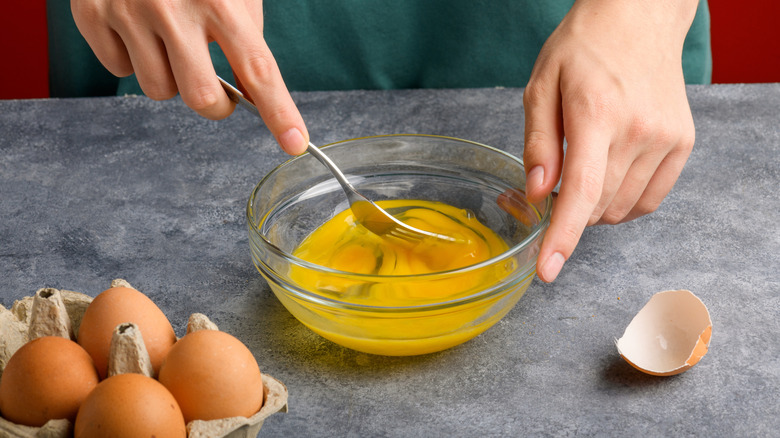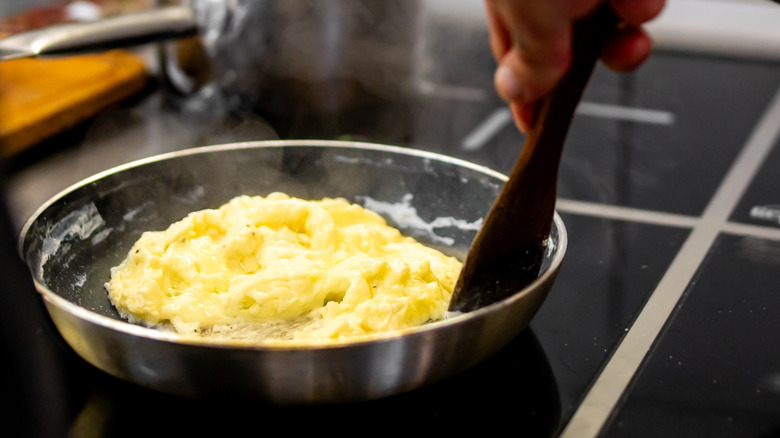The Seasoning Secret You Need For Creamy Scrambled Eggs
For some, the pursuit of the perfect plate of soft scrambled eggs is a lifelong project. With so many variables affecting their quality, from heat to cooking time to what kind of pan you're using, you can find a ton of ways to upgrade your breakfast — and plenty of tips for making the creamiest eggs possible. But no matter how much rigor you bring to this endeavor, you're still working with just three building-block ingredients: eggs, salt, and whatever fat you use for cooking. It's important to make each one count.
What is the secret to creamy scrambled eggs? Salt can have a big impact, and knowing when to add it can spell the difference between an unremarkable breakfast and the fluffiest scrambled eggs you can have at home. So, when should you salt your eggs? In a word, beforehand. We'll get into this more below, but salt affects the way that proteins coagulate in this famously protein-dense breakfast food, and the correct application of it will help your eggs from being too tough or too dry. If you've got 15 minutes to spare before breakfast needs to be on the table, whisk salt with your eggs and set them aside before cooking. It's not any extra work for you in the kitchen, but it could pay dividends at the table.
The science of scrambled eggs
Eggs are made up of about three-quarters water and 13% protein. The protein is the component that makes them so useful as a binding agent — cakes and cookies, for instance, rely on eggs' ability to hold disparate ingredients together. When you beat eggs and then heat them, you're basically engaging in a process of deconstruction and then reconstruction. Whisking — i.e., breaking the yolks and the whites — breaks apart chains of proteins that had previously been locked tightly together. The science-inclined food writer Kenji López-Alt has likened unbeaten egg proteins to the charging cables you might wind up tightly before sticking them in your suitcase ahead of a trip (via The New York Times). When you whisk the eggs, López-Alt says, it's like you're taking those cables out of a bag and letting the wires unwind willy-nilly.
Where does salt come in? Heat causes the egg proteins to coagulate anew, offering both risk and reward — reward because you end up with scrambled eggs, but risk because it can also cause the proteins to bind up too tightly. That can make your eggs chewy and even a little weepy, as the egg proteins may expel water as they tighten. Salt interferes with this process, blocking the proteins from coagulating too strongly and helping ensure a pan of creamy scrambled eggs that are neither too dry nor too watery.
The best time to salt your scrambled eggs
For the creamiest outcome, whisk and salt your eggs a little while before you plan to scramble them. It is possible to overdo it here — López-Alt tried salting eggs and storing them in the fridge for a couple of days before cooking, but ended up encountering a whole other set of problems after about 48 hours. On the other hand, 15 minutes is great, and even just five minutes can help.
There's a flavor benefit to salting your eggs a short time before cooking as well as a textural one; that little bit of time gives the salt more opportunity to dissolve into the eggs, so you'll end up with a final product that's more fully and evenly seasoned. And if you want to level up from there, as we mentioned, the sky's the limit: You can add sparkling water to your scrambled eggs to make them even fluffier.


